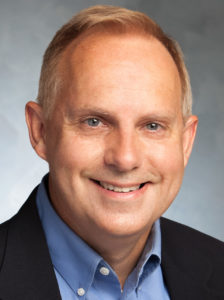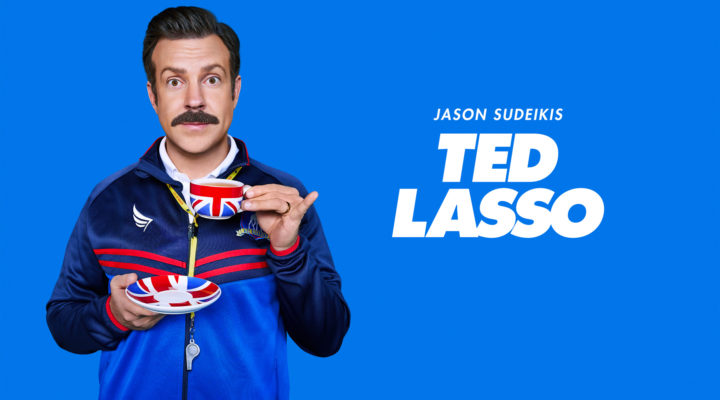At year end, as always, I am reflecting on the books, movies, music and TV that shaped me. During the week that my wife, Jeanie, and I finished watching the acclaimed 2020 Apple TV series Ted Lasso, thousands of Americans died of Covid-19, millions of Americans dealt with hunger insecurity, eviction, and the loss of their jobs or businesses, and the president of the United States pardoned dozens of criminals and obsessed over losing an election.
Many critics have spoken about Ted Lasso as the antidote for 2020, and they’re absolutely right, but I believe this smart, funny and surprisingly moving show about an American college football coach from Kansas who moves to London to coach Premier League soccer is also the antidote for everything that’s wrong with America moving forward. It’s a show about amazing grace, about the importance of community and about the necessity for curiosity about those we would usually judge. I can’t recommend it highly enough.

Greg Garrett
As we were falling asleep the night after finishing the series, Jeanie told the ceiling — and me, mostly unconscious at that point, “I think it’s about grace.” And so it is. Ted Lasso is a show about a person who sees the best in people instead of the worst, who believes that everyone, no matter how difficult or awful, can be better.
In the process of Ted (Jason Sudeikis) extending grace to everyone — which is such a hopeful and ridiculous idea — one character after another begins to change. In the Christian tradition we talk about how in response to amazing grace we hope for what in New Testament Greek is called metanoia — the 180-degree turn that represents our becoming what God calls us to be instead of what our fear and selfishness often make us.
Coach Ted Lasso says that what he cares about is transformation instead of wins and losses — how counter-cultural is that? — and he extends grace and forgiveness to people who most of us would write off.
Under Ted’s influence, his angry team captain, aging legend Roy Kent (Brett Goldstein), becomes a person willing to stand up for his teammates and to embrace the possibility of love. His narcissistic star, young Jamie Tartt (Phil Dunster), makes tiny baby steps toward accountability and vulnerability. And in a stunning scene, team owner Rebecca Welton (played by West End theater star Hannah Waddingham) confesses to Ted what we have known since the first episode: that she brought Ted to England explicitly to fail so her ex-husband could know the despair of his beloved football team tanking, how she had undermined him over and over again, how their entire relationship was a lie. And Ted sits with that for a moment and then he declares: “I forgive you.” As we would say in my family, it’s an incredibly Jesus-y moment.
We don’t act like this. But we should.
“Ted Lasso, over and over again, says that our own personal winning matters less than our connection with others.”
For the last four years, we have been treated to an example of radical narcissism, selfishness and pettiness in service of an individual’s ego. Donald Trump is simply American individualism writ large. But Ted Lasso, over and over again, says that our own personal winning matters less than our connection with others, than our respect and compassion for others. I can’t win unless we all win.
Ted accepts the abuse and contempt that English soccer fans and even his team have for him, because he knows it doesn’t define him. He extends grace and forgiveness, and in the process, he builds a team who respect and care for each other and a community who recognize that there is something distinct and different about Ted.
The central teaching of the Gospel of John can be found in John 13:35: “By this everyone will know that you are my disciples, if you have love for one another.” Love is the answer. What makes ecclesia possible — what makes relationship possible — is our willingness not to make ourselves so damn important, to recognize that our grace and forgiveness to others is a necessity, that we are called to love.
Community is an essential sports value — Jamie’s selfishness is an existential threat to his team as well as to any relationship he might have — and Ted works to build community throughout his organization, from owner Rebecca down to locker boy Nate (Nick Mohammed), who has never even been noticed before. Everybody matters, or nobody matters.
“A commitment to community is also the only way we can move forward in a culture as divided as ours.”
But a commitment to community is also the only way we can move forward in a culture as divided as ours. The people who don’t look like me, or worship like me, or eat like me, or love like me, are still beloved of God.
What might make that possible is one of the series’ central moments, in episode eight of season one. I often tell my screenwriting students that you have to earn your speech, and this monologue is probably Ted’s longest speech in the series, but it is the heart of who he is, and perhaps the heart of what the series is about. After Rebecca’s horrid ex-husband Rupert (Anthony Head) informs Rebecca in the local pub that he has bought back into the team, Ted challenges Rupert to a match of darts for high stakes, and as Ted stands in for his final round, he says he was rocked by a quote from Walt Whitman: “Be curious, not judgmental.”
That’s the wisdom we need for this moment. To engage others, to learn about Black lives, to realize the rich existence propelling every human life forward, we need to ask questions, and we need to suspend judgment.
Ted Lasso is actually based on a series of NBC ads starring Sudeikis some years earlier, and the series features an essential character change: as Shea Corrigan writes, “Sudeikis has said that the biggest change they made when adapting the spot to a series was to change Ted from a man who is ignorant and arrogant to a man who is ignorant and curious.”
What makes Ted Lasso so Jesus-y is simply this: Unlike the view from the top for the last four years, the show reminds us that we need each other to become the people we are called to be. That our own success is bound up in the success of others. That we need to be curious about difference instead of judgmental. That unless we have love for each other, we are nothing.
Ted Lasso helped get many of us through 2020. And it can help us live into 2021.
Greg Garrett teaches creative writing, film, literature and theology classes at Baylor University. He is the author of two dozen books of fiction, nonfiction, memoir and translation, including the critically acclaimed novels Free Bird, Cycling, Shame and The Prodigal. He is one of America’s leading voices on religion and culture. One of his most recent nonfiction books is In Conversation: Rowan Williams and Greg Garrett. His latest book, A Long, Long Way: Hollywood’s Unfinished Journey from Racism to Reconciliation, is new this year. He is a seminary-trained lay preacher in the Episcopal Church. He lives in Austin with his wife, Jeanie, and their two daughters.


